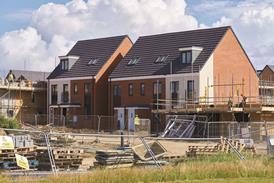For developers, the current environment is proving difficult to navigate. After several years of sustained growth in the housing market, prices have been dropping, which, combined with wider economic challenges – not least a sharp rise in interest rates – and the introduction of stringent new regulations, has left developers feeling the pinch.

This has not gone unnoticed, with developers voicing warnings of threats to profits and the possibility of a crisis among housebuilders potentially unable to find buyers for new builds.
The result of this financial pressure is that developers need to find ways to retain cash in the business or to ensure that it is invested effectively. Accordingly, developers should look to minimise tax costs without sacrificing commercial objectives. The best way to accomplish this is through careful planning.
As a starting point, developers should keep potential VAT costs arising from the purchase of land front of mind. Most land vendors will opt to tax, thus paying VAT on land acquisitions is the norm for most developers, and it is typically a recoverable cost. However, there are exceptions to this norm that will result in VAT becoming a cost to the developer. Whether the VAT will be recoverable will depend on whether the developer intends to construct and sell new-build housing, or whether there is already a forward sale contract for the bare land and/or buildings, possibly to a housing association. As a result, developers should be clear about their intended next steps with any land purchased, as the intended onward supply may result in either a full or partial VAT block.
Even where VAT is fully recovered, the current market is creating another challenge for developers. Once houses are complete, although the intention may remain to sell new-build housing, developers may have to turn to short-term lets while they attempt to find buyers. If VAT has been recovered on the basis that the houses were intended to be immediately sold, some of this may need to be repaid as a result. Developers should, therefore, consider whether they can avoid paying VAT to the land vendor. If this can be avoided, it will save Stamp Duty Land Tax (SDLT) and provide the developer with greater flexibility when it comes to onward supply.
Ultimately, however, if VAT costs are incurred by developers, this will inevitably hit cashflow and erode the margins on development schemes. Accordingly, forward planning prior to the acquisition of land is essential, with close scrutiny given to both the intended and likeliest potential commercial outcomes. This will enable developers to ensure they are in the optimal tax position based on both the individual fact pattern of each development and the group structures that may be in place.
Another relatively recent consideration for developers to be aware of is how to manage the costs associated with the Residential Property Developer Tax (RPDT). Introduced on 1 April last year, the purpose of the tax is to provide the government with funds to remediate cladding on buildings that were deemed as unsafe following the Grenfell fire. The tax itself is levied at 4% on all profits above £25m per annum derived from residential developments – a potentially significant hit to cash reserves, especially when combined with corporation tax rates, which were raised to 25% at the start of this tax year. As a result, developers should take great care to ensure that out-of-scope profits are accurately calculated.
HMRC guidelines state that a fair and reasonable apportionment should be undertaken, but this can pose a challenge for developers, particularly if accounting profits are not separately identifiable across different developments or where the structure of a group is not straightforward.
The increase in interest rates and the likelihood of reduced profits will also mean that developers potentially face restrictions on the amount of interest that can be deducted for tax purposes. To mitigate the impact of this, developers should ensure that they factor this into their planning at the earliest possible point, as this will enable them to both prepare accurate cash tax forecasts and consider how restricted interest might be utilised in the future.
In this challenging economic climate, developers should take particular care to maximise any reliefs available to them. This is always a good policy to follow, but is particularly important in this economically strained period. Notably, there are reliefs available for remediating land and for making use of innovative methods of construction, which are often underutilised by developers.
Taking advantage of these reliefs will provide developers with a much-needed cash benefit and allow for the mitigation of some of the corporation tax due on profits. Ultimately, however, the salient point for developers large and small is to consider the implications of the above tax considerations carefully. This will ensure they have the best possible chance of navigating the rough waters ahead.
Paul Atkins is partner and head of property tax at haysmacintyre































No comments yet